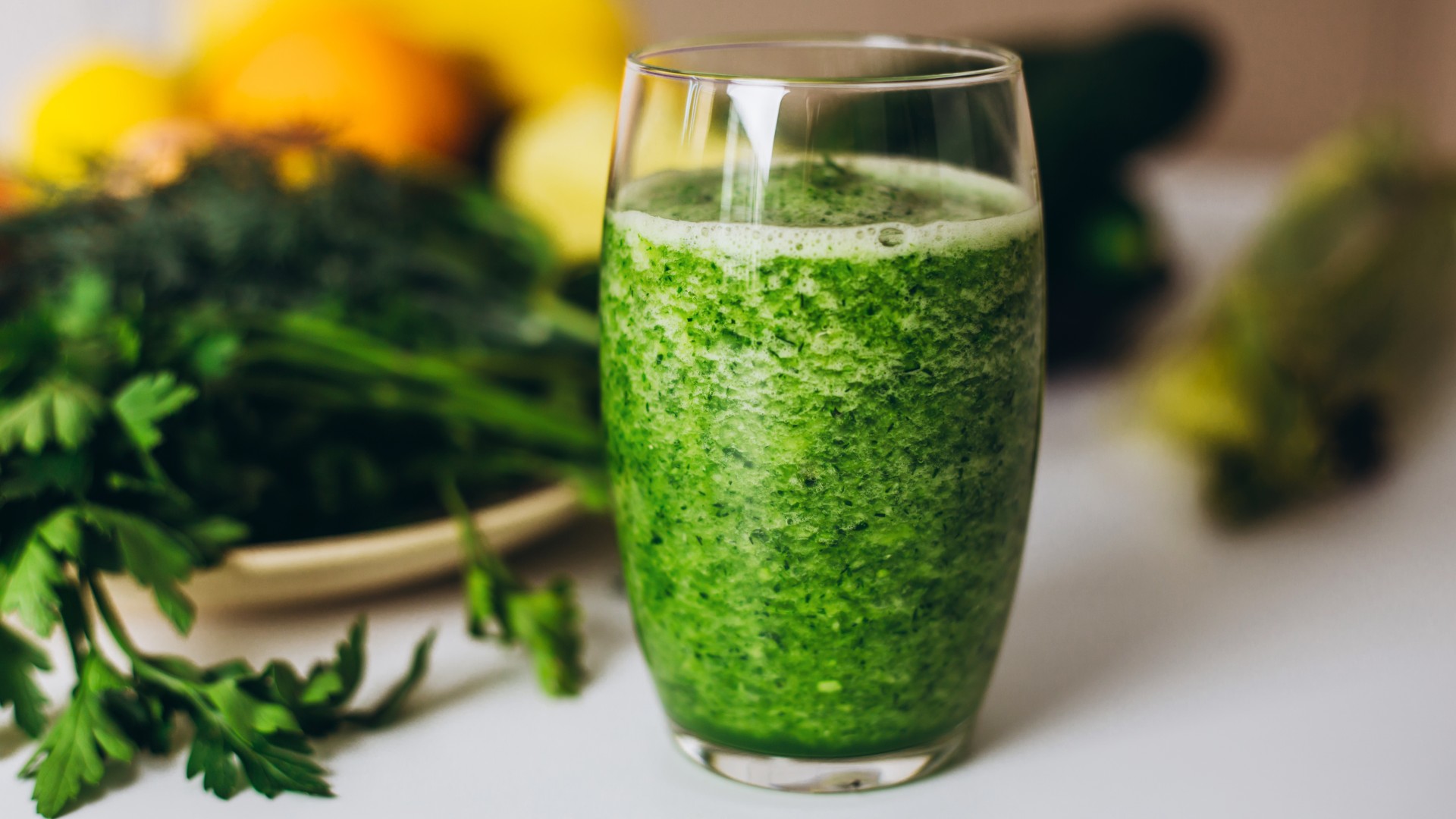Celery: Health benefits & nutrition facts
The health benefits of celery are numerous on top of it being a low-calorie vegetable with a high water content.

- Celery nutrition
- Are celery leaves edible?
- Weight loss
- Anti-inflammatory properties
- Hydration benefits
- Can celery prevent heartburn?
- Is celery good for digestion?
- Can celery lower cholesterol and blood pressure?
- Cancer prevention
- Is celery an aphrodisiac?
- Can celery be bad for you?
- Additional resources
- Bibliography
The health benefits of celery are numerous thanks to it being a low-calorie vegetable with a high water content that contains a sizable dose of fiber, along with some vitamins and minerals. It's a convenient on-the-go snack as well as a vegetable that can be incorporated into cooked dishes, stir-fries and salads.
"Since celery is mostly made of water (almost 95%), it is not particularly high in any vitamin or mineral," according to Megan Ware, a registered dietician nutritionist in Orlando, Florida who spoke to Live Science. Nevertheless, celery is a good source of vitamin K, with one cup containing about 30% of the recommended daily intake, according to the University of Michigan. Celery can also help you get enough folate, potassium, fiber and the micronutrient molybdenum. It contains small amounts of vitamin C, vitamin A and some B vitamins. "Celery is naturally low in calories, carbohydrates, fat and cholesterol," Ware added.
Celery nutrition
Here are the nutrition facts for celery, according to the U.S. Food and Drug Administration (FDA):
Serving size: 2 medium stalks (110 grams/3.9 oz)
Calories: 15 (Calories from fat 0)
Amount per serving (and %DV*) *Percent Daily Values (%DV) are based on a 2,000 calorie diet.
Total fat: 0 grams (0%)
Total carbohydrate: 4 grams (1%)
Dietary fiber: 2 grams (8%)
Sugars: 2 grams
Sodium: 115 milligrams (5%)
Potassium: 260 milligrams (7%)
Protein: 0 grams
Vitamin A: (10%)
Vitamin C: (15%)
Calcium: (4%)
Iron: (2%)
Unlike some vegetables, celery retains most of its nutrients even if it is steamed. A study published in 2011 in the journal LWT – Food and Science Technology compared celery that had been steamed, boiled and blanched and found that, after 10 minutes of steaming, the vegetable still maintained 83% to 99% of its antioxidants, compared with uncooked celery. On the other hand, boiling and blanching led to a 38% to 41% loss in antioxidants.
Celery also has a fairly long shelf life — it lasts up to two weeks in the refrigerator, according to the University of Nebraska-Lincoln.
Are celery leaves edible?
Although many people throw celery leaves in the trash or compost bin, the leaves are perfectly edible, and there are many ways to use them in everyday meals, according to Bon Appetit Magazine.
"Even a beheaded bunch of celery has a few leaves tucked inside its core: pale, sweet and delicious. Use these leaves, the core and celery butt, thinly sliced, to add crunch and aroma to a salad," wrote Tom Hunt for The Guardian.
Weight loss
Two medium-sized stalks of celery contain only about 15 calories, according to the FDA, as shown above. This serving also contains about 2 grams of dietary fiber, which can help curb cravings because fiber absorbs water in the digestive tract, making you feel fuller longer. A study published in 2015 in the journal Annals of Internal Medicine suggested that simply adding more fiber to one's diet can be a critical component of weight loss.
Some people claim that celery is a "negative calorie" food, or one that supposedly takes more calories to digest than it contains, but unfortunately, this is not true, as PIH Health makes clear. In fact, Ware explained, "although celery contains a minuscule amount of calories, the number of calories spent digesting it is probably even smaller."
Anti-inflammatory properties

Celery is rich in compounds called phytonutrients, which are produced by plants and may have antioxidant and anti-inflammatory properties. (Antioxidants are substances that help prevent cell damage, according to the National Institutes of Health; and anti-inflammatory compounds are those that fight inflammation in the body.)
A study published in 2012 in the journal Molecular Nutrition & Food Research suggested that, in lab dishes, celery juice and celery extracts may help reduce activity of inflammatory molecules known as tumor necrosis factor alpha (TNF-A) and nuclear factor kappa B (NF-KB); although studies in mice found that some forms of phytonutrients were absorbed better than others in the gastrointestinal tract. Another study published in 2007 in the journal Planta Medica suggests that the luteolin, another compound found in celery, may be able to inhibit the production of COX-2, an enzyme that triggers inflammation.
A further study in 2017 in the Journal of Evidence-based Complementary & Alternative Medicine concerning research with rats stated, "Experimental studies show that celery has antifungal and anti-inflammatory properties. Moreover, its essential oils have antibacterial effects. Its seeds are useful in the treatment of bronchitis, asthenopia, asthma, chronic skin disorders, including psoriasis, vomiting, fever, and tumors."
Still, since these studies are in lab dishes and animals, it's unclear how well they translate to the human body, according to the American Institute for Cancer Research.
Hydration benefits
According to Ware, celery is about 95% water. This can make eating the vegetable a good way to keep necessary fluid levels up. "Because of its high water content, celery is a great snack to have on hand during the hot summer months to prevent dehydration," Ware said.
Can celery prevent heartburn?
Celery is an old folk remedy for heartburn, as it contains a lot of water that can dilute stomach acid, according to Johns Hopkins University. A study published in 2011 in the journal Annals of Otology, Rhinology & Laryngology included celery in a "low acid" diet prescribed to patients suffering from acid reflux. While their diet was beneficial, further studies are needed to determine celery's specific role.
"The compounds in celery, including apiuman and pectin-based polysaccharides, have proven to decrease the chances of stomach ulcers, improve the lining in the stomach and reduce stomach secretions," according to PIH Health.
Is celery good for digestion?
Fiber is well known for its digestive benefits. It helps keep your bowel movements regular, thereby reducing constipation; helps keep your bowels healthy, and aids in weight maintenance, according to the Mayo Clinic. Two medium stalks of celery provide about 8% of your daily fiber needs, according to the FDA.
Some recent research suggests that the antioxidants in celery could also help protect the stomach lining and reduce the risk of gastric ulcers. A study published in 2010 in the journal Pharmaceutical Biology found that laboratory rats consuming celery extract had fewer ulcers and more protected stomach linings. It is hypothesized that this success was caused by apiuman, a pectin-based polysaccharide found in celery. Still, it's unclear whether the results would translate to people.
Can celery lower cholesterol and blood pressure?
Celery's fiber may help lower cholesterol levels because fiber picks up excess cholesterol compounds in your gut and pushes them out in the elimination process, according to Raleigh Medical Group in North Carolina.
The research on the relationship between celery and cholesterol in humans is limited, but animal studies show promising results. A University of Chicago study described by The New York Times in 1992 found that a chemical in celery called phthalide reduced bad cholesterol levels in rats by 7% and blood pressure by 14%.
One study done on humans, published in 2013 in the journal Natural Medicine Journal, looked at celery seed extract given to people with mild-to-moderate hypertension for six weeks, and saw reduced blood pressure. However, many of the study's authors worked for a company that sells celery extract.
It's important to note that eating whole foods is thought to provide more health benefits than consuming individual compounds in celery or other vegetables, according to the Cleveland Clinic. And celery alone likely won't lower blood pressure; rather, an overall healthy diet rich in vegetables, fruits and whole grains, and low in sodium and saturated fat, has been found to lower blood pressure.
Cancer prevention
The research on celery and cancer risk is not definitive, but antioxidants are sometimes associated with reduced cancer risk. Some recent studies have looked at celery's flavonoid compounds (types of antioxidants) called apigenin and luteolin. A study published in 2013 in the journal Molecular Nutrition & Food Research looked at apigenin in regard to the formation of pancreatic tumors in lab dishes, finding apigenin to be "protective."
Another study, published in 2013 in the journal Food and Chemical Toxicology, looked at both apigenin and luteolin. It too showed positive results, with the compounds inducing cell-death in pancreatic cancer cells. Another study, published in 2011 in the journal Cancer Prevention Research, found similar results regarding apigenin and breast cancer cells, according to the University of Missouri. Still, these studies are very preliminary, and further research in animals and people is needed to confirm the findings.
Is celery an aphrodisiac?

In recent years, celery has gotten buzz for its purported arousing benefits. Celery contains high levels of androstenone and androstenol, which are male pheromones. According to Alan R. Hirsh, author of "Scentsational Sex: The Secret to Using Aroma for Arousel" (Element Books Ltd, 1998), eating celery should increase men's attractiveness to potential romantic partners; however, authors of the book "Neurobiology of Chemical Communication" (2014, CRC Press/Taylor & Francis), disagree, writing, "It does not follow that simply because these compounds are found in body fluids or axillae [armpit] that they communicate meaningful social information or influence reproductive processes in humans."
Much more data is needed to determine whether the androsterone in celery really does increase sexual attraction, according to Healthline. What's more, there's no evidence that eating celery or drinking celery juice increases male sex drive, Healthline reported.
Can celery be bad for you?
With 88 milligrams of sodium per cup, celery has a fairly high salt content for a vegetable. This causes some people watching their salt to worry about eating it, but according to Vicky Ferguson, a Michigan dietician, this doesn't make celery a high-sodium food and one that the salt-aware need to worry much about.
Other risks of eating large amounts of celery include malnutrition and gastrointestinal problems, according to LiveStrong.com. Dieters should be careful not to overdo it on celery because it is so low-calorie and could lead to malnutrition. While fiber is great for you, too much can cause bloating, gas and diarrhea.
According to SF Gate, if eaten in very large, continuous, uncooked quantities, celery could potentially cause goiters, or an enlarged thyroid gland. This is because great amounts of uncooked celery can interfere with the process of iodine functioning in the thyroid. Goiters can cause swelling in the neck, leading to breathing problems and possible hypothyroidism.
Celery also contains chemicals called psoralens, which, if directly applied to the skin, causes it to become temporarily highly sensitive to ultraviolet light, according to a paper published in 2000 in the journal Baylor University Medical Center Proceedings. This means that if you get celery juice on your skin and go into the sun, you could get a rash. The rash, which may burn, will appear within 12 to 36 hours and last for three to five days, though hyperpigmentation (darker skin) could last longer, the paper said. This is mostly a problem for those who work in celery fields.
Celery is known for being exposed to a lot of pesticides. For years, it has appeared on the Environmental Working Group's Dirty Dozen list of produce with the most pesticide contamination, sitting at 11 out of 12 in the 2021 list. EWG recommends that people wash their celery thoroughly, or buy organic if they can.
Although rare, it is possible to be allergic to celery. Celery allergies are associated with birch-mugwort allergies, so if you are allergic to either of those, you may be allergic to celery, according to a paper published in 1984 in the German journal Dtsch Med Wochenschr. Celery allergies are more common in certain European countries, including Switzerland, France and Germany, than in other parts of the world, according to the Anaphylaxis Campaign. Celery allergies can be mild or serious, with symptoms ranging from slight tingling or swelling to anaphylactic shock.
Additional resources and reading
If this deep-dive into the health benefits of celery has grabbed your attention then you may enjoy learning more about the differences between fruits and vegetables.
Excited by the various antioxidant properties of celery? Then we can suggest even more superfoods that you should consider adding to your diet.
Bibliography
- "Warfarin and Vitamin K" University of Michigan
- "Nutrition Information for Raw Vegetables" U.S. Food and Drug Administration
- "Effect of thermal treatment on phenolic composition and antioxidant activities of two celery cultivars" LWT – Food and Science Technology
- "Celery" University of Nebraska-Lincoln
- "There are SO MANY Reasons Not to Throw Away Celery Leaves" by Janet McCracken Bon Appetit Magazine
- "Why are you throwing away your celery leaves?" by Tom Hunt The Guardian
- "Single-Component Versus Multicomponent Dietary Goals for the Metabolic Syndrome" Annals of Internal Medicine
- "Facts and Myths About Celery" PIH Health
- "Antioxidants: In Depth" National Institutes of Health
- "Flavone deglycosylation increases their anti-inflammatory activity and absorption" Molecular Nutrition & Food Research
- "Evaluation of the anti-inflammatory activity of luteolin in experimental animal models" Planta Medica
- "A Review of the Antioxidant Activity of Celery" by Wesam Kooti and Nahid Daraei Journal of Evidence-based Complementary & Alternative Medicine
- "Difference Between Antioxidants and Phytochemicals?" American Institute for Cancer Research
- "GERD Diet: Foods That Help with Acid Reflux (Heartburn)" Johns Hopkins University
- "Low-Acid Diet for Recalcitrant Laryngopharyngeal Reflux: Therapeutic Benefits and Their Implications" Annals of Otology, Rhinology & Laryngology
- "Chart of high-fiber foods" Mayo Clinic
- "Gastric antiulcer, antisecretory and cytoprotective properties of celery (Apium graveolens) in rats" Pharmaceutical Biology
- "Increase Fiber to Decrease Cholesterol" Raleigh Medical Group in North Carolina
- "A New Look at an Ancient Remedy: Celery" The New York Times
- "A Pilot Study to Evaluate the Antihypertensive Effect of a Celery Extract in Mild to Moderate Hypertensive Patients" Natural Medicine Journal
- "Celery May Help Bring Your High Blood Pressure Down" Cleveland Clinic
- "Flavonoid apigenin modified gene expression associated with inflammation and cancer and induced apoptosis in human pancreatic cancer cells through inhibition of GSK-3β/NF-κB signaling cascade" Molecular Nutrition & Food Research
- "Interactions between dietary flavonoids apigenin or luteolin and chemotherapeutic drugs to potentiate anti-proliferative effect on human pancreatic cancer cells, in vitro" Food and Chemical Toxicology
- "Apigenin Prevents Development of Medroxyprogesterone Acetate-Accelerated 7,12-Dimethylbenz(a)anthracene-Induced Mammary Tumors in Sprague–Dawley Rats" Cancer Prevention Research
- "Parsley, Celery Carry Crucial Component for Fight Against Breast Cancer, MU Researcher Finds" University of Missouri
- "Scentsational Sex: The Secret to Using Aroma for Arousel" by Alan R. Hirsch (Element Books Ltd, 1998)
- "Neurobiology of Chemical Communication" by Carla Mucignat-Caretta (2014, CRC Press/Taylor & Francis)
- "Does Celery Have Benefits for Men?" by Daniel Preiato Healthline
- "The Risks of Eating Excess Celery" by Lindsay Boyers LiveStrong.com
- "Is Celery Toxic?" by Sharon Perkins SF Gate
- "Hyperpigmented macules and streaks" by Jennifer Clay Cather, Mark R. Macknet and M. Alan Menter Baylor University Medical Center Proceedings
- "EWG’s 2021 Shopper’s Guide to Pesticides in Produce" Environmental Working Group
- "Food allergy: the celery-mugwort-spice syndrome. Association with mango allergy? By B. Wüthrich and T. Hofer Dtsch Med Wochenschr
- "Celery Allergy: The Facts" Anaphylaxis Campaign
Sign up for the Live Science daily newsletter now
Get the world’s most fascinating discoveries delivered straight to your inbox.
Jessie Szalay is a contributing writer to FSR Magazine. Prior to writing for Live Science, she was an editor at Living Social. She holds an MFA in nonfiction writing from George Mason University and a bachelor's degree in sociology from Kenyon College.










